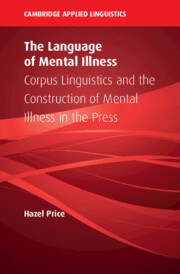 The Language of Mental Illness
The Language of Mental Illness Ways of Talking about Having Mental Illness
Published online by Cambridge University Press: 05 May 2022
Chapter 8 explores the ways in which the press talk about people having mental illness using a mixed-methods approach. In the chapter, the frequency and semantic and pragmatic content of the verbs ‘suffer’ and ‘ experience’ in the context of prescribed forms for talking about having mental illness are investigated. I show that ‘suffer’ and ‘experience’ occur in different semantic contexts in the MI 1984–2014 Corpus as well as general language corpora, which may contribute to ‘suffer’ being a more problematic term for describing mental health than ‘experience’. Moreover, I show that ‘suffer’ is proportionally less likely to be used in first-person narratives because ‘suffering’ is attributed to people with mental illness by others, for example, medical professionals, in reported speech. I bring together my findings in a set of lexicogrammatical heuristics based on the semantic content of ‘suffer’ and ‘experience’ in context (e.g. whether the word encodes animacy or is temporally bounded).
To save this book to your Kindle, first ensure no-reply@cambridge.org is added to your Approved Personal Document E-mail List under your Personal Document Settings on the Manage Your Content and Devices page of your Amazon account. Then enter the ‘name’ part of your Kindle email address below. Find out more about saving to your Kindle.
Note you can select to save to either the @free.kindle.com or @kindle.com variations. ‘@free.kindle.com’ emails are free but can only be saved to your device when it is connected to wi-fi. ‘@kindle.com’ emails can be delivered even when you are not connected to wi-fi, but note that service fees apply.
Find out more about the Kindle Personal Document Service.
To save content items to your account, please confirm that you agree to abide by our usage policies. If this is the first time you use this feature, you will be asked to authorise Cambridge Core to connect with your account. Find out more about saving content to Dropbox.
To save content items to your account, please confirm that you agree to abide by our usage policies. If this is the first time you use this feature, you will be asked to authorise Cambridge Core to connect with your account. Find out more about saving content to Google Drive.